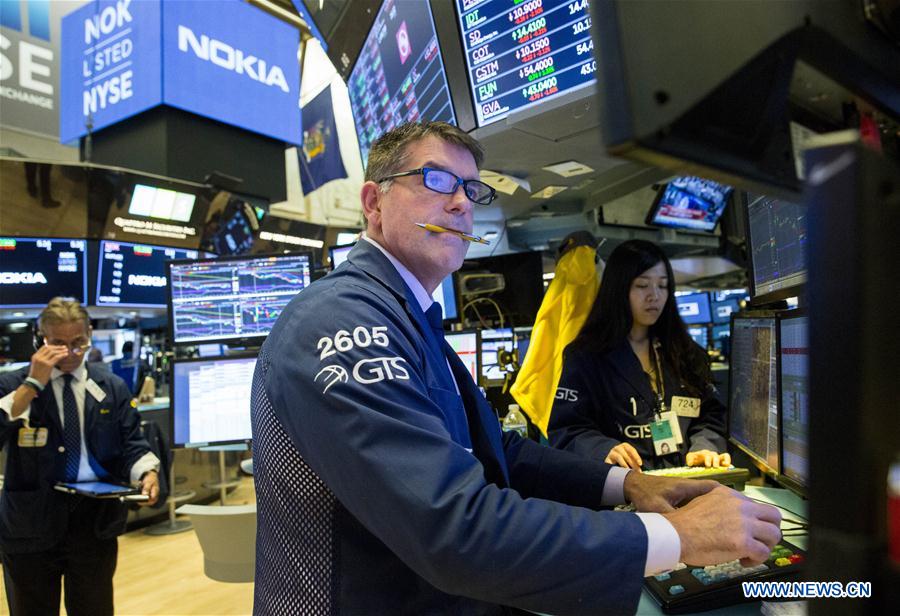
(Photo: Xinhua)
A big early gain for US stocks has mostly evaporated Friday, leaving major indexes only somewhat higher after two days of steep losses. Stocks remain volatile after the plunge, and they are on track for their biggest weekly losses in six months as investors have been rattled by big increases in interest rates and concerns that US-China trade tensions are impairing global economic growth.
The Dow Jones Industrial Average jumped as much as 414 points shortly after trading began. It had fallen more than 1,300 points over the previous two days. Technology companies regained a small piece of their recent losses, but other groups of stocks including banks and industrial companies turned lower following a strong start. Most of the stocks on the New York Stock Exchange fell.
The S&P 500 index added 4 points, or 0.2 percent, to 2,733 at 2:15 p.m. Eastern time. The benchmark index tumbled 5.3 percent over the past two days and as of Thursday it had fallen for six consecutive days. The S&P is down 6.7 percent since from its latest record high, set Sept. 20.
The Dow edged up 49 points, or 0.2 percent, to 25,088. The Nasdaq composite gained 63 points, or 0.9 percent, to 7,392. The Russell 2000 index gave up 12 points, or 0.8 percent, to 1,532. That index, which is made up of smaller and more US-focused companies, has fallen into a 10-percent “correction” since reaching a record high at the end of August.
Apple climbed 1.6 percent to $217.79 and Microsoft gained 1.5 percent to $107.49. Consumer-focused companies also rallied, as Amazon jumped 2.2 percent to $1,756.73 and Netflix surged 4.5 percent to $335.43. Those companies have taken startling declines the last few days. On Wednesday the three most valuable US companies, Apple, Microsoft and Amazon, each took their biggest loss in more than two years. It was a dramatic end to three months of calm on the US market.
The market’s losing streak started when strong economic data and positive comments from Federal Reserve Chair Jerome Powell helped set off a wave of selling in the bond market. Investors dumped bonds as they bet that the US economy would keep growing at a healthy pace. The sales pushed bond prices lower and yields to seven-year highs.
That drove interest rates sharply higher, which worried investors who felt that a big increase in interest rates could eventually stifle economic growth. The International Monetary Fund also cut its forecast for global economic growth this week because of trade tensions and increased interest rates.
Sam Stovall, chief investment strategist for CFRA, said he thought stocks fell too far, but there could be more turmoil ahead for the markets. While stocks had done well in spite of the rising trade tensions between China and the US, investors seem more worried now.
“Everybody has been pretty much dismissing the effect of the trade war on US equities, and now they’re beginning to think ‘wait a minute, maybe there could be a problem,’ ” he said. “I don’t think the reasons for the decline have been resolved.”
High-dividend stocks including utilities, real estate investment trusts and household goods fell Friday. Those stocks held up a bit better than the S&P 500 over the last six days. Investors view them as relatively safe, steady assets that look better when growth is uncertain and the rest of the market is in turmoil.
Several other groups of stocks that have struggled this year are now in a “correction,” a drop of at least 10 percent from a recent peak. They include basic materials makers, internet companies, banks and household goods makers.
US crude oil fell 0.1 percent to $70.93 a barrel in in New York. Brent crude, the international standard, lost 0.3 percent to $80.01 a barrel in London.
Bond prices were little changed. The yield on the 10-year Treasury note remained at 3.13 percent.
US automakers Ford and General Motors continued to slump. GM shed 2.2 percent to $31.60, its lowest in almost two years, and Ford dipped 2.8 percent to $8.57, its lowest in almost nine years. Both have fallen more than 20 percent this year as they deal with slowing sales and the Trump administration’s tariffs on steel and aluminum, which are sending their manufacturing costs higher.
The stocks have fallen further in recent days following reports Ford might cut jobs. In late September, Ford CEO Jim Hackett said the steel and aluminum duties would cost the company $1 billion through 2019.
Asian stocks also rebounded. Japan’s Nikkei 225 index gained 0.5 percent after sinking early in the day and following a nearly 4 percent loss on Thursday. Hong Kong’s Hang Seng surged 2.1 percent and the Kospi in South Korea rose 1.5 percent.
European stocks finished mostly lower. The French CAC 40 dipped 0.2 percent and so did the FTSE 100 in Britain. The DAX in Germany slipped 0.1 percent.
After a big jump Thursday, gold lost 0.5 percent to $1,222 an ounce. Silver rose 0.2 percent to $14.64 an ounce. Copper slipped 0.1 percent to $2.80 a pound.
The dollar slipped to 111.98 yen from 111.94 yen. The euro fell to $1.1561 from $1.1594.


